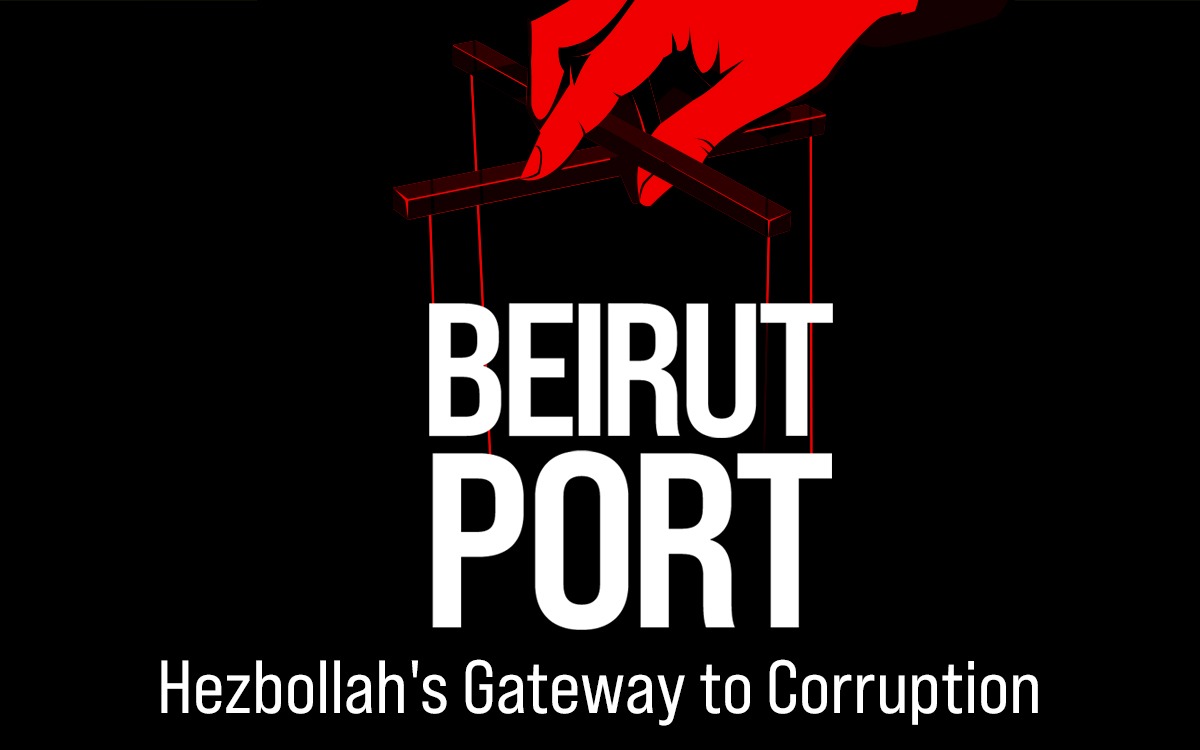
On August 4, 2020, at 6:08 pm, the Port of Beirut exploded in one of the largest non-nuclear explosions in history.
Dubbed the Beirut Blast in its aftermath, the explosion killed over 200 people, injured thousands more, and displaced half of Lebanon’s capital city after it was left in ruin.
In the weeks and months following the explosion, more and more information continued to come to light, implicating a growing number of Lebanon’s political class in varying degrees of involvement in allowing the 2,750 tons of ammonium nitrate to be improperly stored in Hangar 12 for years – ultimately leading to the devastating explosion.
For many, though, the fact that this fertilizer was being stored in the port for years without any accountability came as little surprise, as Beirut’s port has long been a mainstay for corruption, with members of the political class utilizing it for their own varying benefits.
According to Michael Young, a senior editor at the Carnegie Middle East Center in Beirut, the corruption at the port goes back to the Lebanese Civil War, when the political parties that rule the country today were little more than warring militias.
“During the war years it was a shared interest of the militias,” he told NOW. “They would benefit on both sides.”
‘A microcosm of the corrupt ecosystem’
Corruption in Beirut’s port is not a new issue. It has existed for as long as the political parties that control Lebanon existed. Yet under the watchful eyes of Hezbollah, Iran’s Lebanese outlet, the Beirut port was transformed into a key hub in Iran’s elaborate money-making scheme, using this once flourishing port to export Captagon, and to import and smuggle a wide array of contraband used to bankroll their activities across the region.
“The port was used by the militias to finance themselves during the war,” Young explained. “The militias could control different parts of the port.”
“Like any big infrastructure in Lebanon which can generate money, this is how the militias used it and they would sometimes share the spoils,” he added.
Even after the war ended and the state took control of the port, it did little to combat the corruption. Instead of militias controlling certain parts of it, the parties now had officials in place that they could rely on to ensure that their goods made it through without having to pay any taxes.
According to Mohammad Chamseddine, a member of the Beirut-based research and consultancy firm Information International, an estimated one to two billion dollars in revenue is lost to the state each year from importers evading paying customs duties, with the majority of the evasion taking place at Beirut’s port.
No one specific party is the main culprit in this tax evasion, with former President Michel Aoun’s Free Patriotic Movement, Parliamentary Speaker Nabih Berri’s Amal Movement, and former Prime Minister Saad Hariri’s Future Movement all having been implicated in the corruption at the port.
“There are different people who have been named to positions of authority in the port,” Young stated. “So, presumably, like everything else in this country, there is a division of the spoils and this is reflected in the fact that different political forces appoint different figures in the port. Everything that produces wealth in Lebanon tends to be divided.”
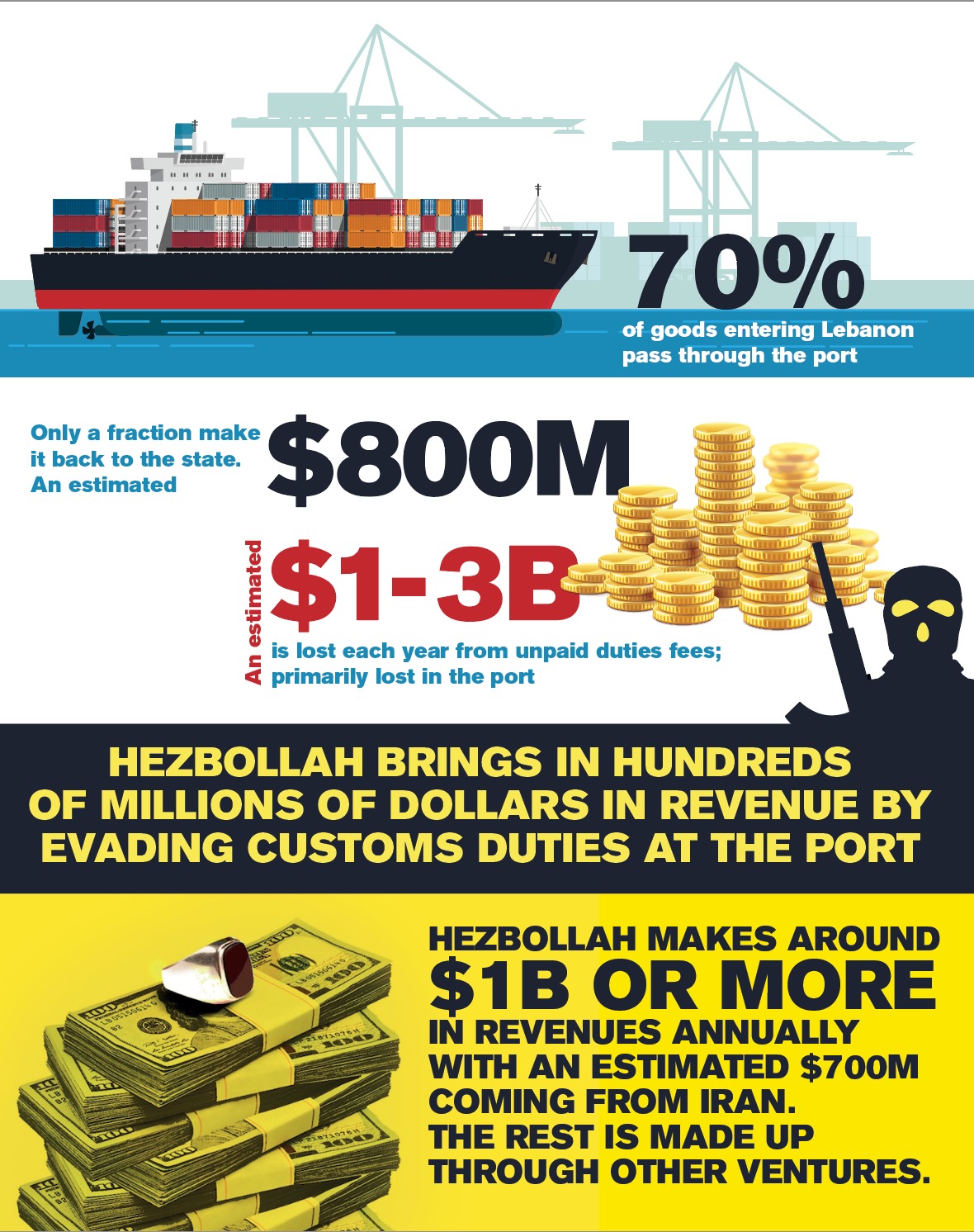 Firas Maksad, a senior fellow at the Middle East Institute in Washington DC, agreed with Young’s assessment of the port and how the politicians have exploited their connections there for decades, adding that the port is essentially a sample of the larger problems Lebanon is facing.
Firas Maksad, a senior fellow at the Middle East Institute in Washington DC, agreed with Young’s assessment of the port and how the politicians have exploited their connections there for decades, adding that the port is essentially a sample of the larger problems Lebanon is facing.
“No doubt Beirut’s port represents a microcosm of the corrupt ecosystem in Lebanon, particularly in Lebanese state institutions, but perhaps even more so given that in many ways it’s a gold mine for feeding off state revenues and evading custom duties,” he told NOW.
While some of the tax evasion is evident, in other matters it can be much more subtle. Young used the purchase of a new mobile phone as an example.
“If you go to buy telephones that are much cheaper than in other parts [of Lebanon], there must be a reason for this,” he said. “These things are brought in without paying for an import duty, which is why they can sell them at a discount.”
In this respect, Hezbollah and its various business fronts have been able to control the mobile phone market through brothers Kamel Mohamad Amhaz and Issam Mohamad Amhaz, who are the main supplier of the Lebanese market and operate out of Hezbollah stronghold in the southern suburbs of Beirut.
In July 2014, the Amhaz brothers and their Stars Group Holding were sanctioned by the US for “acquiring a range of engines, communications, electronics, and navigation equipment from companies in the United States, Asia, Canada, and Europe for Hezbollah’s use in UAVs and for other projects.”
In return for their services the Amhaz brothers, protected by Hezbollah’s top military leader Mustafa Baderdinne, were given a free hand to use the Beirut port and other border crossings to expand their network. Following the killing of Baderdinne during combat in Syria, the Amhaz brothers were arrested by the Lebanese authorities for smuggling charges and later released on bail.
At the time, information indicated that Hezbollah was trying to force the Amhaz brothers to hand over Baderdinne’s shares of their companies, which was estimated at $70 million.

Baderdinne was accused by the Special Tribunal for Lebanon of leading the hit squad which assassinated former Prime Minister Rafik Hariri in February 2005.

Despite most of Lebanon’s political parties having taken part in the corruption at the port, the majority of them are motivated by importing cheaper goods that could then be sold on the market. Hezbollah, on the contrary, has little interest in simply just importing goods that it can later sell. Rather, according to Maksad, the port poses as more of a strategic military and security asset.
“The rationale behind how Hezbollah has is for strategic, military and security purposes,” he stated, with an aim to “promote its military objective in addition to providing revenue that goes back to the party.”
Hezbollah has long denied that it uses the port to smuggle weapons into the country, although experts note that Hezbollah, just like the other political parties, has its own ties and connections to customs and port officials with the main difference being what they use those connections for.
It is not only imports, however, that are exploited. The infamous amphetamine captagon has long been found to pass through Beirut’s port, with millions of tablets having been seized on their way to the Gulf or Europe.
It is unclear, however, if the drug is being smuggled out of Lebanon, or if the illicit shipment is just pit-stopping at the port. Iran’s narco activities, specifically in captagon manufacturing and trafficking, is estimated to generate around $77 billion in annual revenue, as Iran and its subsidiaries control over 80 percent of this sector.
The Syrian government, a key ally of Hezbollah, has also been connected with the production and smuggling of captagon with the military’s fourth armored division, headed by Syrian President Bashar al-Assad’s brother Maher, being central to the production of the drug.
Moreover, Hezbollah’s goods are able to pass uninterrupted through the port easier than that of other parties, as they are considered to be part of the “support for the Resistance,” essentially giving them a “free pass” when bringing imports into the country.
 Fruits of Hezbollah’s labor
Fruits of Hezbollah’s labor
In February 2021, Saudi customs intercepted 250 crates of pomegranates in the port of Jeddah which had been exported through the Port of Beirut. Upon scrutiny, the fruit was found to have been used to smuggle 5.3 million captagon pills. A similar shipment of Lebanese oranges containing 9 million pills was seized by Kuwaiti customs. These unsavory shipments were one of the reasons that ultimately led the Arab Gulf states to ban imports of fruit and vegetables originating from or transiting through Lebanon, a move that cost the Lebanese farmers millions of dollars in annual revenues.
Lebanon exports “100,000 tons of fruits and vegetables in annual exports to the Kingdom of Saudi Arabia, worth $24 million” while the United Arab Emirates receives exports of edible fruits, nuts, peel of citrus fruit and melons worth $212.83 million during 2021, according to the United Nations COMTRADE database on international trade.
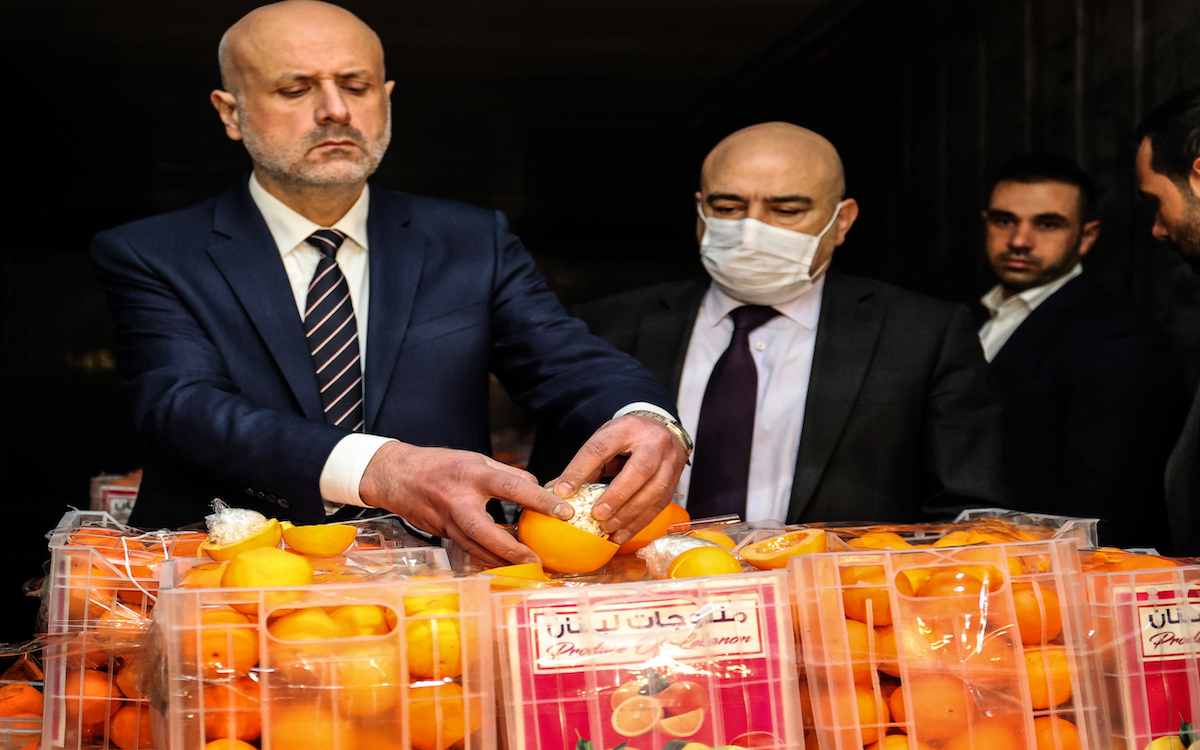
Lebanon’s Interior Minister Bassan al-Mawlawi (L), checks one of the fake oranges filled with Captagon (an illegal drug) pills and dissimulated in boxes containing real fruit, after the shipment was intercepted by the customs and the anti-drug brigade at the Beirut port, in the Lebanese capital, on December 29, 2021. – Lebanese customs agents seized today, nine million Captagon pills hidden in a shipment of oranges in the port of Beirut, destined to one of the Gulf countries, Mawlawi announced. (Photo by ANWAR AMRO / AFP)
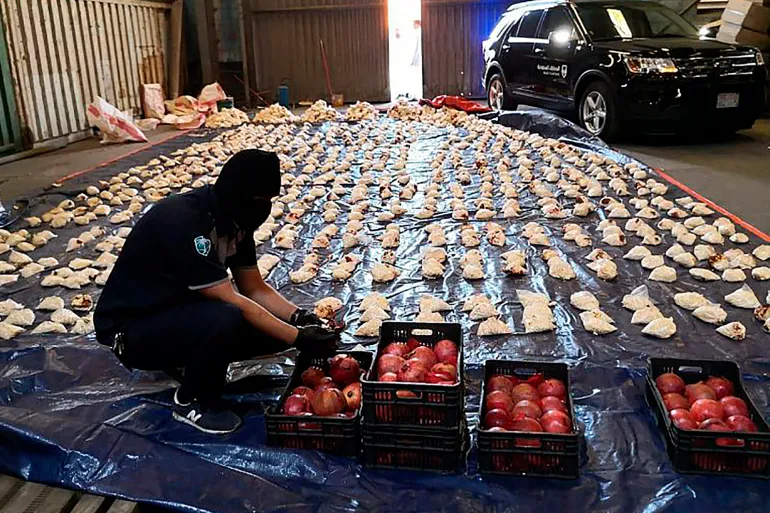
A Captagon seizure bound for Saudi Arabia. Photo: SPA
Hezbollah’s narcotics business exposes the Lebanese Shiite farmers, many of which are from the Bekaa valley in the East of Lebanon, thus forcing them to rely on the subsidies provided by Hezbollah, which in turn subjugates them to the party’s political will.
Hajj Wafiq and the Beirut port
The US has targeted several members of Hezbollah and affiliated individuals for their misuse of the port to bring contraband weapons into the country.
Wafiq Safa, Hezbollah’s top-public security official, was sanctioned by the United States treasury for exploiting Lebanon’s ports and border crossings to smuggle contraband and facilitate travel on behalf of Hezbollah. For example, Hezbollah leveraged Safa to facilitate the passage of items, including illegal drugs and weapons, into the port of Beirut, Lebanon. Hezbollah specifically routed certain shipments through Safa to avoid scrutiny. Additionally, as of 2018, Hezbollah facilitated favors at the Beirut airport. Safa also facilitated travel for Hezbollah associates through a border crossing.
Safa, who is the main security interlocutor between the Iranian and Lebanese states, marched into the Lebanese ministry and threatened Tarek Bitar, the judge leading the Beirut port explosion, informing him that “We’ve had it up to our noses with you. We will stay with you until the end of this legal path, but if it doesn’t work out, we will uproot you.”
By using his position and coordinating with other senior Hezbollah members, Safa was able to amass millions of dollars which his sons are managing as part of a large portfolio of real estate and business assets. In April 2020, al-Jadeed TV ran a long investigative feature exposing Safa’s elaborate network of corruption, listing his and his family’s assets, which were acquired over the last two decades.

“We’ve had it up to our noses with you. We will stay with you until the end of this legal path, but if it doesn’t work out, we will uproot you.”
Since the economic crisis began, Hezbollah has not been oblivious to the situation in the country and the hardships that its constituents face. In the early days of the crisis, Nasrallah called on shop owners to keep their prices low so that people would not suffer as much – a call that was observed by many storeowners in Shiite-majority areas.
However, as the crisis worsened, this became unsustainable, leading Hezbollah to establish its own stores, a new facet to the party’s welfare programs, stocked with products that are competitively cheaper than their competitors which has led some to speculate that they are able to sell at such lower prices because the goods are smuggled into Lebanon.
It is partly due to this strategic importance that the port poses to Hezbollah that the Iran-backed party has been so staunchly opposed to an independent investigation into the Beirut Blast.
Resisting the investigation
After the port explosion in 2020, the Lebanese people’s demands for accountability were swift.
On August 8, 2020, protestors flocked to the streets of Beirut to express their sorrow and rage in what turned out to be some of the most violent clashes with security forces that the city has seen in years. The protesters were demanding that this crime not remain on the judiciary’s shelves gathering dust, while its perpetrators go free.
Their demands were seemingly answered when Judge Fadi Sawan was appointed to lead the investigation into the port explosion.
Sawan was quick to start pointing fingers, calling former ministers in for questioning.
However, his investigation was short-lived. He was removed on February 18, 2021 for an alleged conflict of interest that would prevent him from leading an impartial investigation.
Sawan was swiftly replaced by another independent judge, Tarek Bitar, who picked up where his predecessor left off, calling current and former ministers in for questioning. The politicians proceeded to file complaints against Bitar, forcing the investigation to stop until he was cleared.
Much to the chagrin of the ministers accused by Bitar, Lebanon’s courts, which have been politicized for decades, surprisingly ruled in favor of the judge, allowing him to continue his investigation.
Young stated that whether they were vocal about it or not, the vast majority of Lebanon’s politicians likely do not want too many eyes looking into the daily happenings in Beirut’s port, given the level of corruption taking place there.
“It’s a pandora’s box. No one in the political establishment deep down really wants the public’s eye on how things are done at the port,” he said.
Still, Hezbollah has been the most vocal in their opposition to the investigation, though they have so far not been directly implicated in the investigation.
During an October 12, 2021 speech, Hezbollah Secretary-General Hassan Nasrallah accused Bitar of being incapable of delivering the truth and that the judge would, in fact, do the opposite by delivering “only injustice and obscuring the truth.”
This culminated in the October 14, 2021 clashes in Tayyouneh in Beirut, when supporters of Hezbollah and its Shiite ally, the Amal Movement, clashed with gunmen that were allegedly associated with the Christian Lebanese Forces.
The shootout took place as supporters of Hezbollah and Amal were holding a protest by the Ministry of Justice in opposition to Bitar and his investigation.
In an attempt to create a narrative that would justify his removal, Hezbollah supporters on social media have also waged a public campaign accusing the judge of being the reason for the violence in Tayyouneh.
Despite both vocal and tacit opposition, Bitar remains in his post.
Maksad noted that Hezbollah’s strong stance against Bitar makes sense given the vested interest that the party has in maintaining its operations in the port.
“It’s because of this very distinct differentiation between other parties using the port for corrupt purposes and Hezbollah to further its strategic objectives that their resistance to the judicial probe is primarily emanating from Hezbollah because Hezbollah is the primary suspect for keeping and storing explosives like nitrates at Beirut’s port,” Maksad explained.
“The other parties are not expected to be liable since they are not using it for military and strategic purposes. Their involvement would most likely be limited to nepotism and corruption.”
The investigation into the port explosion has been stalled for well over a year now, and despite his best efforts, Bitar has been unable to get it going again.
Though there has been increased focus on Hezbollah and its use of the port following the August 4 explosion, Maksad also emphasized that “while there has been so much attention on the port, and rightfully so as a result of the explosion where hundreds of innocent people lost their lives, it is also important not to lose focus in that this problem is not limited to the port of Beirut,” as the group has used land border crossings and Beirut International Airport for its own purposes all under the blanket statement that it is to support the Resistance.
What remains certain is that Hezbollah and its various fronts continue to run the Beirut port as an integral part of their global network of illicit funding and money laundering operations. Hezbollah stands accused of not only impeding the investigation into the August 4th port explosion, but of siphoning millions of dollars and depriving the Lebanese of funds needed for the country’s resurrection.


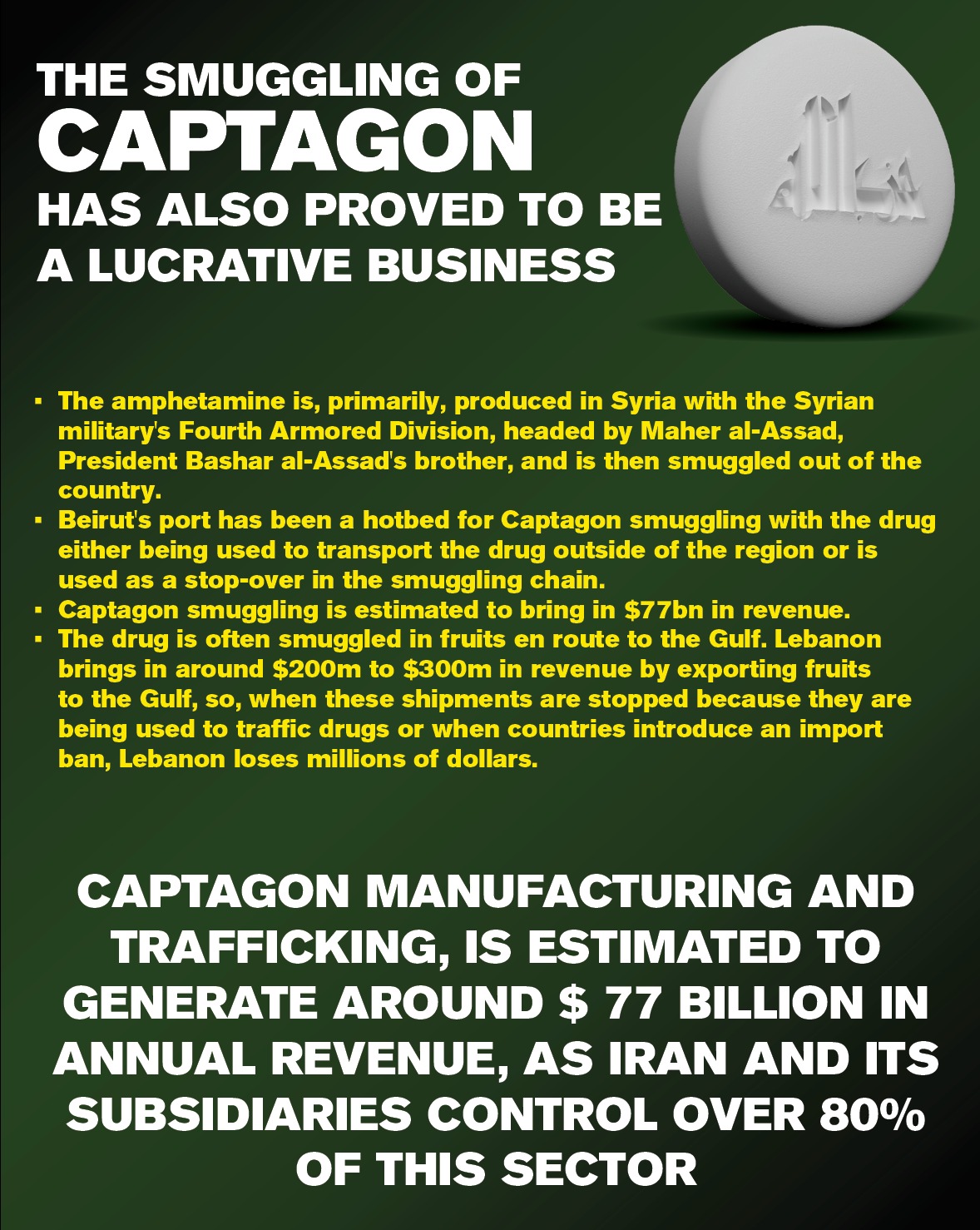 Fruits of Hezbollah’s labor
Fruits of Hezbollah’s labor




